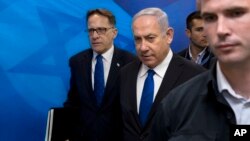Israeli Prime Minister Benjamin Netanyahu has posted a video of himself praising Iranians in his latest bid to revive a historic friendship with Iran’s people while challenging and criticizing their Islamist rulers.
In the 80-second video clip posted to the social media accounts of the Israeli prime minister’s office Thursday, Netanyahu says Iranians are among the “most gifted and successful people” in the world.
He goes on to list several major U.S. companies founded and led by entrepreneurs of Iranian heritage, including Uber, eBay and Dropbox, and asks why Iran is so “poor,” given the talents of its people.
“The answer is in two words: the regime,” Netanyahu says. “Iran's dictators plunder the country's wealth (and) divert tens of billions of dollars to their nuclear program, to the spread of terror around the world (and) to their aggression throughout the Middle East.”
Iran denies Israel’s accusation that it seeks to develop nuclear weapons and says it is a victim rather than perpetrator of regional terrorism.
Netanyahu last posted a video message to the Iranian people January 1, saying he wished them “success in their noble quest for freedom.” He was referring to mass anti-government protests that erupted in cities across Iran in late December, posing the biggest domestic challenge to Iran’s Islamist leadership in years.
Tzvi Kahn, a senior Iran analyst at the Washington-based Foundation for Defense of Democracies, told VOA Persian that Netanyahu is adopting a long-term strategy of trying to foster a friendly image with Iranians, in case the ongoing anti-government protests lead to the ouster of Iran’s Islamist rulers.
“Israel is trying to communicate to Iranians that the re-imposition of U.S. sanctions against Iran is not motivated by hostility toward the people but as a punishment of the regime,” Kahn said. “Israel also is sending a message to the Trump administration that it supports U.S. expressions of solidarity with the Iranian people and wants the U.S. to continue that approach.”
In a May 8 speech announcing his decision to withdraw from the 2015 nuclear deal between Iran and six world powers, President Donald Trump contrasted his strong criticisms of the nation’s Islamist leaders with kinder words toward Iranians as a whole. Iranians, he said, “are the rightful heirs to a rich culture and an ancient land, and they deserve a nation that does justice to their dreams, honor to their history and glory to God.”
Netanyahu’s latest video message drew almost 100 comments and 2,000 views on his office’s Farsi Twitter account by late Thursday. Many Iranians who commented on the post in Farsi and English welcomed the message.
But one Farsi speaker with the handle @nasehi3 was skeptical of Netanyahu’s concluding remark that expressed a hope of seeing Iranian and Israeli entrepreneurs “working together, in Iran and in Israel, for the betterment of all humanity.” User @nasehi3 asked if he or other Iranians will live to see such a day or die at the hands of Iran’s Islamist rulers.
Israel and Iran enjoyed a cooperative relationship before the 1979 Islamic Revolution, which brought to power Islamist clerics hostile toward the Jewish state. Relations between the two regional powers have been tense since.
This report was produced in collaboration with VOA’s Persian Service.




